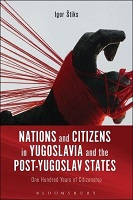Chapter 1 Brothers United
The Making of Yugoslavs
| dc.contributor.author | Štiks, Igor | |
| dc.date.accessioned | 2018-08-08 11:35:32 | |
| dc.date.accessioned | 2020-04-01T13:09:19Z | |
| dc.date.available | 2020-04-01T13:09:19Z | |
| dc.date.issued | 2015 | |
| dc.identifier | 642971 | |
| dc.identifier | OCN: 1030818669 | en_US |
| dc.identifier.uri | http://library.oapen.org/handle/20.500.12657/30754 | |
| dc.description.abstract | Chapter 1 shows the historical trajectory of the idea that South Slavs as linguistic and cultural ‘brothers’ should form a single nation and establish their own national state. The state came into being after the First World War when citizens of different pre-war entities (empires and kingdoms) came together to form a political community. The attempts to make it viable and functional proved difficult. Chapter 1 shows competing ideas about Yugoslav political unification that directly affected citizenship as well as citizens’ relationship with the new state: unitarism vs federalism; one nation vs many nations; common vs multinational culture; monarchy vs republic. It shows how the first citizenship regime was created on a unitary basis and why it came in existence almost 10 years after the creation of the state. It portrays a crisis-ridden country and a fragile community within which communists as a new political force will emerge with their own vision how to transform Yugoslavia. The revolver came from Serbia, but the finger that pulled the trigger that would kill Franz Ferdinand and thus announce the end of one world and the birth of another acted upon two strong beliefs. If one can judge from his statement, underage Gavrilo Princip, like so many of his peers, was foremost convinced that South Slavs should be liberated from a foreign yoke and unite in their own state; this belief was strongly though not articulately mixed with another conviction that the world about to come must be the world of profound social transformation. Two motives with which our story of ‘one hundred years of citizenship’ begins will be repeated in many different forms during this century: should South Slavs have their own common state? Or form separate ones? And, regardless of the answer, should political transformations entail more social equality or only a change of the rulers at the top of the existing hierarchy? Every idea often has deep roots and various historic materializations. One of the two ideas that materialized in that finger that eventually pulled the trigger on 28 June 1914 had started its long voyage to Sarajevo almost a century before. | |
| dc.language | English | |
| dc.subject.classification | thema EDItEUR::J Society and Social Sciences | en_US |
| dc.subject.classification | thema EDItEUR::J Society and Social Sciences::JP Politics and government | en_US |
| dc.subject.other | unitarism | |
| dc.subject.other | federalism | |
| dc.subject.other | communists | |
| dc.subject.other | first world war | |
| dc.subject.other | yugoslavism | |
| dc.subject.other | kingdom of yugoslavia | |
| dc.subject.other | unitarism | |
| dc.subject.other | federalism | |
| dc.subject.other | communists | |
| dc.subject.other | first world war | |
| dc.subject.other | yugoslavism | |
| dc.subject.other | kingdom of yugoslavia | |
| dc.subject.other | Croats | |
| dc.subject.other | Serbia | |
| dc.subject.other | Serbs | |
| dc.subject.other | Socialist Federal Republic of Yugoslavia | |
| dc.subject.other | South Slavs | |
| dc.title | Chapter 1 Brothers United | |
| dc.title.alternative | The Making of Yugoslavs | |
| dc.type | chapter | |
| oapen.identifier.doi | 10.5040/9781474221559.ch-002 | |
| oapen.relation.isPublishedBy | 066d8288-86e4-4745-ad2c-4fa54a6b9b7b | |
| oapen.relation.isPartOfBook | 652c73a7-2e3d-4da9-8af8-4cde5d8e61a4 | |
| oapen.relation.isFundedBy | FP7 Ideas: European Research Council | |
| oapen.collection | European Research Council (ERC) | |
| oapen.pages | 25-36 | |
| oapen.pages | 11 | |
| oapen.place.publication | London | |
| oapen.chapternumber | 2 | |
| oapen.grant.number | 230239 | |
| oapen.grant.acronym | CITSEE | |
| oapen.grant.program | FP7 | |
| oapen.remark.public | Relevant Wikipedia pages: Croats - https://en.wikipedia.org/wiki/Croats; Kingdom of Yugoslavia - https://en.wikipedia.org/wiki/Kingdom_of_Yugoslavia; Serbia - https://en.wikipedia.org/wiki/Serbia; Serbs - https://en.wikipedia.org/wiki/Serbs; Socialist Federal Republic of Yugoslavia - https://en.wikipedia.org/wiki/Socialist_Federal_Republic_of_Yugoslavia; South Slavs - https://en.wikipedia.org/wiki/South_Slavs; Yugoslavism - https://en.wikipedia.org/wiki/Yugoslavism; Yugoslavs - https://en.wikipedia.org/wiki/Yugoslavs | |
| oapen.identifier.ocn | 1030818669 |

